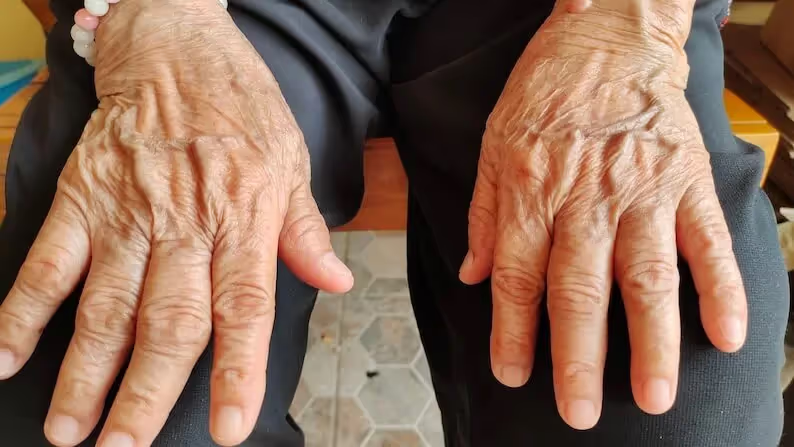Our hands are extraordinary tools, allowing us to perform countless tasks every day. But did you know that your hands can also provide valuable insights into your overall health? From changes in skin texture to the appearance of your nails, your hands might be trying to tell you something important. For seniors, paying attention to these signs can be crucial in detecting and addressing potential health issues early on.
Nail Changes: More Than Just Cosmetic
Your nails are not just for aesthetics; they can be windows into your health. Noticeable changes in color, texture, or thickness might indicate underlying conditions:
- Pale Nails: If your nails have lost their usual pinkish hue and appear pale, this could be a sign of anemia or poor circulation. Both conditions are common in older adults and can lead to fatigue and other complications if not addressed.
- Yellow Nails: Nails that have taken on a yellowish tint might be signaling a fungal infection. While common, untreated fungal infections can become painful and may spread to other parts of the body.
- Ridged or Pitted Nails: Vertical ridges are a natural part of aging, but deep pits or horizontal grooves may indicate psoriasis or arthritis. If you notice these changes, it might be worth consulting with a healthcare provider.
Dry, Cracked Skin: A Sign of Hydration or More?
As we age, our skin tends to become drier, but sometimes dry, cracked hands can be more than just a sign of aging.
- Dehydration: Lack of adequate water intake can cause your skin to lose moisture, leading to dryness. Seniors should ensure they are drinking enough water daily to maintain skin elasticity.
- Thyroid Issues: Extremely dry skin on your hands, especially if accompanied by other symptoms like weight gain or fatigue, could be a sign of hypothyroidism. This condition is relatively common in older adults and can be managed with medication.
- Eczema or Dermatitis: Persistent dryness, redness, and itching might indicate eczema or contact dermatitis. These conditions can be triggered by allergies or irritants and may require medical treatment to prevent worsening.
Shaky Hands: Understanding Tremors
Tremors or shakiness in your hands are often associated with nervousness or fatigue, but they can also indicate other health issues:
- Essential Tremor: This is a common neurological disorder that causes involuntary shaking, usually during movement. While it's not life-threatening, it can interfere with daily activities and may require medication or other therapies.
- Parkinson's Disease: One of the hallmark symptoms of Parkinson's is a resting tremor, which means your hands may shake even when you're not moving them. Early detection is key to managing this condition, so if you notice this symptom, consult a doctor.
- Medication Side Effects: Certain medications, including some prescribed for seniors, can cause hand tremors as a side effect. If you notice this, talk to your healthcare provider about possible alternatives.
Cold Hands: Circulation and Beyond
Cold hands can be more than just a reaction to chilly weather; they might indicate circulation problems or other health issues.
- Poor Circulation: As we age, blood flow to extremities can decrease, leading to cold hands. This can be exacerbated by conditions like peripheral artery disease (PAD) or diabetes, both of which require medical attention.
- Raynaud's Disease: This condition causes blood vessels in your hands to narrow in response to cold or stress, leading to cold, pale, or blue fingers. While not usually serious, Raynaud's can be uncomfortable and may require lifestyle adjustments.
- Anemia: Cold hands can also be a symptom of anemia, which occurs when your body doesn't have enough healthy red blood cells to carry adequate oxygen to your tissues.
Swollen Hands: What to Watch For
Swelling in the hands can occur for various reasons, some of which might need medical attention.
- Arthritis: Osteoarthritis and rheumatoid arthritis can cause swelling in the joints of the hands. This can lead to stiffness, pain, and difficulty performing everyday tasks. Early diagnosis and treatment can help manage symptoms and improve quality of life.
- Edema: Swelling in the hands could be due to fluid retention, also known as edema. This can happen as a result of heart, kidney, or liver problems. If swelling persists, it's essential to seek medical advice.
- Carpal Tunnel Syndrome: This condition occurs when the median nerve is compressed, leading to numbness, tingling, and swelling in the hands. Carpal tunnel syndrome is treatable, especially if caught early.
Numbness or Tingling: Nerve Signals
Numbness or tingling in the hands, often described as "pins and needles," can be more than just an annoyance.
- Peripheral Neuropathy: Common in people with diabetes, peripheral neuropathy results from nerve damage and often causes numbness or tingling in the hands and feet. Managing blood sugar levels can help control this condition.
- Vitamin Deficiency: Lack of certain vitamins, especially B12, can cause tingling in the hands. Seniors should ensure they are getting a balanced diet or consider supplements if recommended by a healthcare provider.
- Stroke: Sudden numbness or weakness in one hand, especially if accompanied by other symptoms like facial drooping or difficulty speaking, could be a sign of a stroke. Immediate medical attention is crucial in such cases.
Listen to What Your Hands Are Telling You
Your hands can reveal a lot about your overall health. As you age, it's essential to pay attention to the signs your body is giving you, including those from your hands. Regular check-ups with your healthcare provider, staying hydrated, maintaining a balanced diet, and being aware of any changes in your hands can help you catch potential health issues early and manage them effectively. Remember, your hands are not just tools for your daily life; they are also key indicators of your well-being. Don't forget to subscribe to our blog to receive healthy living articles just like this right in your inbox.




